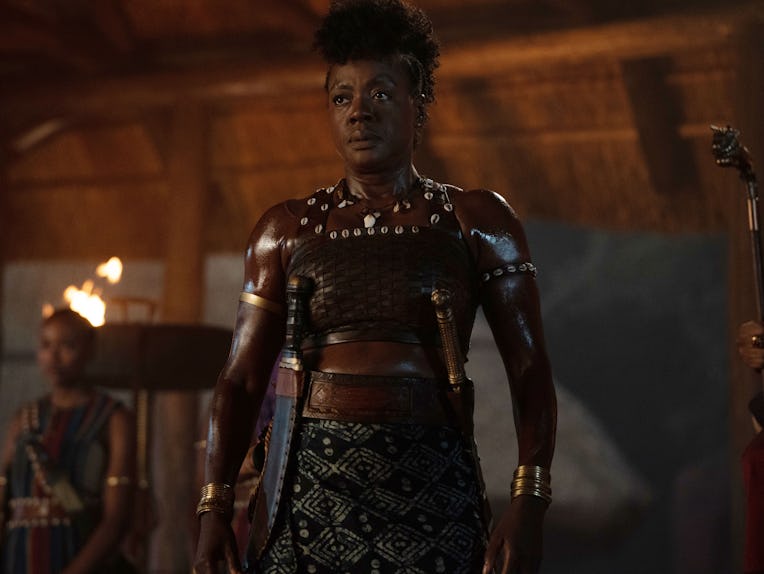'The Woman King' Is a Glorious Epic
See it big, see it loud

It has been a good year for blockbusters, all things considered, barring you ignore growing Marvel fatigue, whatever it was that came and went with Minions: The Rise of Gru (I guess he rose?) and that there was a whole other Chris Pratt Jurassic World movie none of us care about. Top Gun: Maverick pew-pew-pewed its way to cultural domination, Elvis’s bedazzled run lasted nearly all summer, and Jordan Peele’s Nope cemented its writer/director’s place as one of cinema’s most inventive voices. Across an ocean (or two), RRR smashed records before traveling stateside to near-universal acclaim. All of which is to say, there’s a high bar for success and a crowded field of crowd pleasers as a new and bombastic challenger approaches: The Woman King.
Gina Prince-Bythewood’s historical epic is a bold and thoroughly enjoyable film, thematically on par with the likes of Gladiator or The Northman though still wholly original in its own right. Written by Dana Stevens based on a story by Cathy Schulman and Maria Bello (yes, that one), The Woman King tells the story of a group of all-female warriors known as Agojie who defend the West African kingdom of Dahomey from both neighboring kingdoms and invasive slave traders. At the film’s helm is the formidable Viola Davis as the Agojie’s general Nanisca tasked with training a group of new recruits, including the plucky and disobedient Nawi (Thuso Mbedu), as the kingdom hovers on the brink of war.
There is plenty to commend Prince-Bythewood for in the execution of The Woman King, but perhaps, most notably, it’s the first film in a minute where all the above-the-line talent is in the pocket. Davis, whose gravitas precedes her, has been referring to the film as her “magnum opus,” which is hard to argue against. As Nanisca, she is fearsome and commanding, but not devoid of pathos or wisdom or even a gentle humor. She’s matched well with Mbedu, whose (purposefully) irritating rogue nature challenges what both women know to be strength of character. Davis is flanked by Lashana Lynch and Sheila Atim. The former is perhaps best known to audiences for her small but memorable turn in this past fall’s No Time To Die in which she was also 007, but really it was just a title, and then the movie shelved her in lieu of Bond’s domestic crisis. As Izogie, Lynch sparkles: charming, funny, threatening. Atim plays Amenza, Nanisca’s second-in-command, her support system and fiercest warrior. John Boyega plays the women’s king, Ghezo, sitting pretty atop a little chair with a scar-free complexion and a gaggle of cowrie shell-adorned wives. Boyega burst onto the scene a little over a decade ago with a revelatory and memorable turn in Attack the Block, only to wither away in the newer Star Wars movies that always promised more than they delivered. It’s thrilling to see him back in a role that is worthy of his stardom.
The Woman King’s emotional beats work so well perhaps because of the strengths of the performances — these are lived in, distinctive characters, whose differences give them something to talk about and argue through — but also because of so much of the below-the-line work on the film too. Stevens’s script is mercifully without anachronistic winking or any of the knockoff Whedonesque hobnobbing often found in contemporary big budget action flicks. Stevens and Prince-Bythewood are also unwilling to underestimate their audience, never stooping to over-explain or enunciate what they mean or what is happening, relying instead on the quality of story to see the audience through. Terence Blanchard’s score is sweeping and often romantic — reminiscent of Last of the Mohicans in its robust swell. The production design too is immaculate, with impeccable costuming and prop and weapon work. Shot on location in South Africa, the film is devoid of chintzy green screen, or obvious studio-shot settings. The film’s only stumble at times is in its editing, particularly within the action sequences, which are frenetic and choppy, and at times difficult to follow. Though the actors and stunt team seem more than up to the challenge (a few extended shots suggest as much), the battle scenes are disjointed and arguably too short.
Her work, dating back to her fabulous debut Love & Basketball, has focused on what the body can handle — in love, under duress, during times of war.
Still, The Woman King is a marvel to behold — tense, surprising, violent, and affecting. It’s less an anomaly than it is a culmination of much of what Prince-Bythewood has put on the screen for the past few decades. Her last feature, The Old Guard, had a muted but appreciative reception on Netflix during the height of the first pandemic summer. That film, also an action movie, was a grim and punishing tax, heavier on fight scenes than robust characterization. Her work, dating back to her fabulous debut Love & Basketball, has focused on what the body can handle — in love, under duress, during times of war. She is an unblinking, courageous filmmaker with a knack for feeling. The world hurts: why turn away from it? In The Woman King, she’s woven together all that she holds dear and knows is worth fighting for.